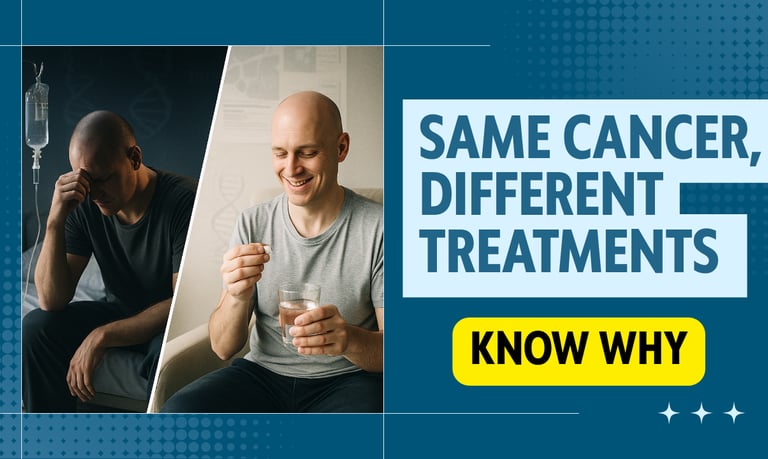Why Two People with the Same Cancer May Get Different Treatments


Why Two People with the Same Cancer May Get Different Treatments
Cancer is one of the most complex diseases in medicine. Even when two people are diagnosed with the “same” type of cancer - say, breast cancer or lung cancer - the treatment plans they receive can look very different. For many patients and families, this can be confusing. “Why did she get surgery first and I’m starting with chemotherapy?” “Why is he on immunotherapy but I’m not?”
As a medical oncologist practicing in Delhi at Fortis Hospital, I frequently hear these concerns. This blog aims to explain the many reasons why cancer treatment is not one-size-fits-all and why personalized care is actually a sign of the best possible treatment approach.
Cancer is Not Just One Disease
When people hear the word "cancer," they often think of it as a single condition. In reality, cancer is an umbrella term for over 100 different diseases - and even within the same organ, cancers can behave very differently.
For example:
Two people may be diagnosed with breast cancer, but one may have hormone-receptor-positive (HR+) cancer while the other has triple-negative breast cancer (TNBC).
A lung cancer patient may have non-small cell lung cancer (NSCLC) with a specific EGFR mutation, while another does not.
This biological variation at the genetic and molecular level is a key reason why treatments differ, even if the cancer “sounds” the same.
1. Stage of Cancer at Diagnosis
One of the most important factors in deciding treatment is cancer staging. This includes:
Tumor size
Lymph node involvement
Spread to other organs (metastasis)
For instance:
A patient with early-stage breast cancer (Stage I) may be offered surgery followed by radiation.
Another patient with Stage IV breast cancer may start with systemic therapy like chemotherapy, targeted therapy, or immunotherapy.
2. Tumor Biology and Molecular Profile
We now have advanced diagnostic tools like:
Immunohistochemistry (IHC)
Next-generation sequencing (NGS)
Liquid biopsies
These tests reveal:
Whether the tumor is HER2-positive
Whether it expresses PD-L1, making it suitable for immunotherapy
Whether it has genetic mutations like BRCA, EGFR, ALK, etc.
Based on these results:
One patient may benefit from targeted therapy (like trastuzumab in HER2+ breast cancer)
Another may need chemotherapy because their tumor lacks such targets
3. Age and Overall Health
A 35-year-old woman with cervical cancer will likely have a very different treatment plan than a 70-year-old woman with the same diagnosis but multiple health issues like diabetes or heart disease.
Treatment decisions are often influenced by:
Organ function (kidneys, liver, heart)
Performance status
Other co-existing illnesses
In such cases, minimally invasive treatments or dose adjustments are made to reduce side effects and improve quality of life.
4. Patient Preferences and Priorities
Every person has a unique perspective on treatment. Some patients:
Prefer aggressive treatment even if side effects are significant
Others prioritize quality of life, minimal hospital visits, and fewer side effects
A good oncologist doesn’t just treat cancer - they listen. Shared decision-making is essential.
For example:
One patient may opt for chemotherapy at a hospital
Another may choose oral targeted therapy at home, even if it's slightly less aggressive
5. Treatment Availability and Accessibility
Certain advanced therapies or clinical trials may be available only in selected cancer centers. At Fortis Hospital, Shalimar Bagh, we offer:
Access to cutting-edge immunotherapies
Precision oncology services
Multidisciplinary tumor boards
So a patient treated here may have access to options not available at smaller centers.
This doesn’t mean one person is getting “better” treatment - just different, based on location, infrastructure and resources.
6. Socioeconomic Factors and Support System
In real-world practice, doctors must also consider:
A patient’s financial capacity
Availability of caregivers at home
Work or family obligations
This may influence:
In-patient vs. day-care chemotherapy
Preference for oral over IV medications
Ethical care doesn’t mean giving everyone the same thing - it means giving the right thing to the right person, sustainably.
7. Response to Previous Treatments
Two people may start with similar plans but as treatment progresses, their response may vary.
For example:
One patient’s tumor shrinks rapidly after 3 cycles of chemotherapy
Another shows minimal response and needs a change in protocol
Oncologists must remain flexible and monitor progress with:
Regular imaging (CT, PET-CT scans)
Tumor markers
Clinical symptoms
8. Availability of Biomarkers and Tests
Sometimes, the difference in treatment arises due to early testing and biomarker evaluation. Patients who undergo comprehensive molecular testing early are more likely to be placed on precision therapy, whereas delayed or unavailable reports may lead to standard protocols initially.
At Fortis Hospital, we follow evidence-based, timely diagnostics, ensuring treatment plans are optimized from Day 1.
A Real-World Example: Two Lung Cancer Patients
Let’s say:
Patient A is a 50-year-old man with NSCLC, no mutations, and PD-L1 >50%
Patient B is a 55-year-old woman with NSCLC and an EGFR mutation
Their treatments will be entirely different:
Patient A may be offered immunotherapy like pembrolizumab
Patient B will likely start with EGFR-targeted therapy (like osimertinib)
Same cancer, very different science behind it.
The Role of Multidisciplinary Teams (MDT)
At advanced cancer centers like Fortis, every case is discussed by a team of:
Medical oncologists
Surgical oncologists
Radiation specialists
Radiologists
Pathologists
Nuclear Medicine specialists
Molecular oncology experts
Genetic counselors
Nutritionists & counselors
This ensures no stone is left unturned. One patient may benefit from neoadjuvant therapy (chemo before surgery), another may be better off with surgery first, based on tumor response and expert opinion.
Conclusion: Personalized Cancer Treatment Is the Future
If two patients have the same cancer but receive different treatments - it is not a sign of confusion or inequality. In fact, it is a reflection of how advanced oncology has become.
At Fortis Hospital, Shalimar Bagh, we believe in evidence-based, personalized and compassionate care. Every decision is made keeping in mind:
Tumor biology
Stage
Patient health and preferences
Latest treatment options
If you or a loved one is confused about treatment differences or want a second opinion, feel free to consult with me. As one of the leading cancer specialists in Delhi, my goal is to help you make informed and confident choices.
📞 Book a Consultation - 9311221315
Dr. Suhail Qureshi
Additional Director & Unit Head, Medical Oncology
Fortis Hospital, Shalimar Bagh, Delhi
Youtube - https://www.youtube.com/@Dr.SuhailQureshi
Google - https://g.co/kgs/rAHFKcE
Facebook - https://www.facebook.com/dr.suhail.qureshi/
Instagram - https://www.instagram.com/drsuhailqureshi/
